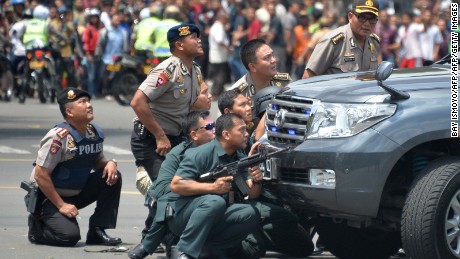Attack In Indonesia Highlight Resurgence Of Militancy
The chief of the Jakarta police said it is necessary for Indonesia to reinforce its defenses against the Islamic State and collaborate with other countries in its fight against ISIS following the attack in Jakarta by gunmen and suicide bombers.
The three-hour siege resulted close to the shopping district of the capital of Indonesia resulted to the death of seven individuals even with the gunfight and multiple blasts. Five of those killed were the attackers. This is not the first time the most populous country in the world has been targeted by the radical group. The attack also shows an indication of a new type of militancy in the country where it is not uncommon for the police to be attacked.
A high alert status was raised among police forces around the country while a number of embassies within the city were closed following the attack in Jakarta. Security in Bali was also increased. The resort island draws in numerous Australian and Asian visitors.
Three persons were reportedly arrested in Depok after they were suspected of planning an attack. Metro TV indicated that the three men were connected to Thursday’s attack in Jakarta. The group was composed of a preacher, a bomb-maker and a firearms expert. No confirmation was made by the police in connection to the arrests.
Police Chief Tito Karnavian of Jakarta said it is necessary for them to “pay serious attention” to the ascent of ISIS. He made the statement outside Sarinah, the oldest department store of Jakarta, where the attack happened.
He added that it was necessary for them to reinforce their preventive and response measures, including laws to prevent these attacks. He is also hoping to work with their counterparts in other countries since it is a part of the network of ISIS.
The chief security minister of Indonesia, Luhut Pandjaitan, said his office is working to institute changes in the law to allow preemptive arrests. Experts are in agreement to the emergence of the threat posed by radicalized Muslims who are inspired by the Islamic State. But, the low death toll on Thursday’s attack in Jakarta shows the local militants involved were poorly trained and used crude weapons.

Attack In Indonesia Highlight Resurgence Of Militancy - image credit: cnn.com
A dual Canadian-Algerian citizen and an Indonesian were killed in the attack, which seriously wounded 24 people, including a Dutchman, an Austrian and a German.
The attack was claimed by the Islamic State saying a group of soldiers from the Indonesia caliphate “targeted a gathering from the crusader alliance” fight the Islamic State in the city.
Karnavian confirmed that ISIS was behind the attack in Jakarta and the mastermind was Bahrun Naim, an Indonesian militant. Naim is believed to head the Katibah Nusantara, a militant network, and is based in Raqqa, the de facto capital of the Islamic State in Syria.
Karnavian said Naim is aiming to unit all elements supporting ISIS in Southeast Asia, including Indonesia, the Philippines and Malaysia. Militants from these countries have supposedly been working together while a number of suicide attacks were carried out by some Malaysians in the Middle East.
While Islamic militants have carried out attacks in Indonesia in the past, the coordinated assault during the recent attack in Jakarta is unprecedented. It is also reminiscent of the attacks in Mumbai and Paris. Naim encouraged Indonesians to follow the example set by jihadists in the capital of France through a blog post.
Attorney General George Brandis of Australia said he was certain the Islamic State is aiming to set up a caliphate in Indonesia. The country has been the target of militant attacks in the 2000s and the deadliest happened in Bali, which resulted to the death of 202 individuals.
Even as domestic militant cells have been reduced by police since then, authorities are concerned about the inspiration provided by the Islamic State resulting to resurgence in militancy. Din Syamsuddin, leader of the second-biggest Muslim organization in Indonesia warned against “Islamophobia” after the attack in Jakarta but encouraged Muslims to refrain from being radicalized.
However, experts have indicated that since most of the Muslims in Indonesia practice a moderate type of Islam, it is unlikely for the population to be heavily influenced by Islamic militancy. Elizabeth Pisani, author and Indonesia foreign correspondent indicated that while a number of the young men in Indonesia may find the stories spun by ISIS appealing, their discontent is mainly due to economic marginalization rather than political or religious persecution.